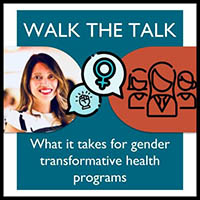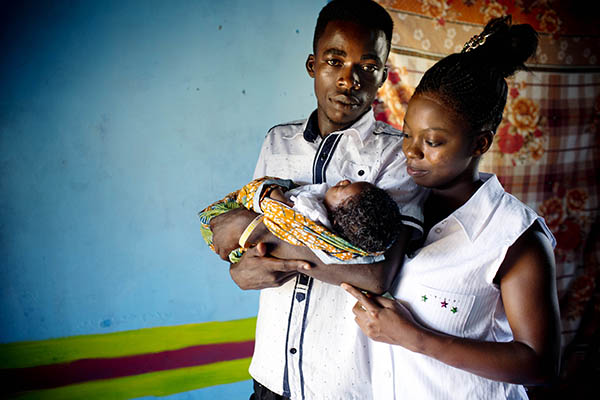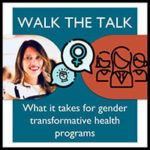Walk the Talk: What it takes for gender transformative health programs

By Myra L. Betron, Gender Director, Jhpiego
When I began my journey toward a career in gender and global development, I was a graduate student studying international relations and economics. To me, investing in girls’ education and economic empowerment was an obvious priority —so much so that I investigated the cost-benefit analysis of girls education and women in the economy in Latin America as my graduate research project.
However, I quickly learned the limitations of focusing on financial empowerment alone. In my first internship, I worked with a women’s microenterprise in Guatemala, where I mentored women on basic business skills. My mentee Rosario often did not make it to work because her husband beat her. When I asked her Guatemalan colleagues why she stayed with him, they said, that is just the way of life here.
This story has a been a recurring theme over the course of my career. For example, years later, while working in Tanzania on preventing behaviors that increase HIV risk, such as gender-based violence, I was told that women in some communities believe that they are unloved if their husbands do not beat them.
And recently, on a visit to Nepal to promote gender initiatives, health volunteers shared stories of women who stay isolated in cow sheds during menstruation—despite laws against that practice—because they fear the consequences if they don’t.

Photo Credit: Jhpiego/Kate Holt
Education and economic empowerment remain priorities to improve women’s status and promote health and development in today’s world. So do safety and freedom from violence, of course. But there are other significant variables that influence women’s engagement with the world and leadership in their community.
Entrenched gender roles, norms and expectations override many women’s choices in the low- and middle-income countries where I work and hinder their growth. To close the confidence gap for women and foster their advancement, there must be:
- Equal expectations or social rules about what girls and women should and should not do in public and private spheres;
- Equal opportunity and choice in roles and participation in all spheres of society, including the household, community and representation in institutions and government; and
- Institutions, laws and policies that promote gender equality.
Today, the rhetoric around “women’s empowerment” has swelled to reach the highest echelons of influential players—from Bill and Melinda Gates to Ivanka Trump. Women and girls’ education and economic empowerment—access to assets, income and social networks—are touted as top-tier investments with exponential returns for females and their families because mothers reinvest in their children. But as researcher Kathryn Moeller has pointed out, to gain the best return on this investment “patriarchal relations between men and women” must be transformed.
Millions of women around the world do not reach their full potential because they are constrained by gender norms and roles that affect their sexual and reproductive health, as well as their ability to lead at work. These women and so many others would benefit from programs that aim to transform gender roles and promote more gender-equitable relationships between men and women. Such programs are more effective in achieving desired changes in behavior than those focused solely on women’s health or economic needs.
Yet few health and development initiatives are funded to include these transformative approaches. The Sustainable Development Goal on gender equality calls for the elimination of all forms of discrimination against women and girls by 2030, a lofty and likely unattainable objective given the abysmal rates of investments in health programs that actually seek to transform gender norms.
While global, multi-agency institutions—such as the Global Fund to Fight AIDS, Tuberculosis and Malaria; Gavi, the Vaccine Alliance; and Family Planning 2020—have raised billions of dollars to fight various health issues, there is no parallel fund to address gender inequality.
Some of these bodies do have gender equality strategies, but without designated funding or targets specifically for gender transformative interventions, we will never achieve the global goal.
It’s a big ask, but vital. The problems of gender inequity are deep and pervasive.
Jhpiego, my organization, promotes gender equality by addressing the various ecological factors that influence a women’s access to, quality, choices and decision when it comes to her and her family’s health. Whether at home or in the workplace, we aim to transform gender roles and norms across the community—including within health systems and among health providers, clients and other influencers.
With meaningful investments in interventions that change the social constructs upholding inequalities, gender equality can be the norm. Let’s not wait to make that happen.
About the Author

Myra L. Betron has 16 years of experience managing and implementing programs on gender and gender-based violence in the context of sexual and reproductive health in 20 countries. As Jhpiego’s Gender Director, she oversees a portfolio of 20 projects with 60 gender advisors, focal points and program managers who are addressing gender inequities in health. She leads the integration of strategies to promote gender-sensitive and transformative health interventions for the U.S. Agency for International Development’s (USAID’s) flagship Maternal and Child Survival Program. Ms. Betron previously served as Senior Technical Advisor for Gender, Policy and Advocacy on the EngenderHealth’s CHAMPION project in Tanzania, a unique program with the primary goal of transforming norms of masculinity that drive HIV risk behaviors, including gender-based violence. Prior to that, she worked as a Gender Specialist at the International Center for Research on Women and at the Futures Group, where her research and projects fed into USAID guidance on gender integration in HIV and sexual and reproductive health programs. She began her career at the World Bank managing capacity-building pilot projects on violence against women and male involvement in reproductive health for health care providers in Bolivia, Honduras and Nicaragua. Ms. Betron has an MA from the Johns Hopkins School of Advanced International Studies. She has an associate appointment at the Johns Hopkins Bloomberg School of Public Health where she lectures on gender and health systems.





Responses